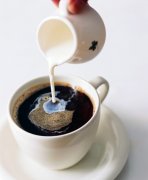Careless cultivation of St. Helena Coffee in Britain

-○ May 21, 2000, when the battleship of Portuguese Captain Joao da Nova was returning northward from the Cape of good Hope and crossing the vast expanse of the South Atlantic Ocean, a sudden warning came from the sentinel that he had found land. Nova ordered to sail to this unknown island that had never been found to find out. The island is surrounded by cliffs, providing the best natural insurance, and there is only one beach to get in and out of the island. Captain Nova led his officers and men to explore the island and found that it was an uninhabited garden of Eden. The island was heavily wooded, rich in expensive ebony, and could not see poisonous insects, beasts and predators, but the cold wind was bitterly wet and far away from the land, so it was not suitable to live for a long time. Before leaving, the officers and soldiers kept a few sheep according to naval practice and planted several lemon trees so that the newcomers could have food to eat. Nova named the island St. Helena after the mother of Constantine the Great.
Over the next few hundred years, St. Helena became a supply depot for fleets on voyages to Asia, or a place for sailors to recuperate.
When St. Helena was discovered, Europeans had no idea what coffee was, and there were no coffee trees in Asia and Latin America, but the new drink kava, brewed in coffee fruit, was becoming popular in Yemen, and the Arab world was caught in a craze. Europeans still sell beer and wine alone.
Although St. Helena has been excavated, it is still alone in the South Atlantic, unheard of. Until 1732, more than 200 years later, in order to catch up with the coffee transplant fever, the British East India Company also learned from France and the Netherlands to obtain bourbon coffee trees (that is, Yemeni round beans) from the Yemeni mocha and plant them on the British island of St. Helena (which the British had taken from the Portuguese) and left it to fend for itself. 83 years later, when a great hero army of Napoleon was defeated by the British and Prussian forces at Waterloo, Britain realized that the isolated island of St. Helena in the South Atlantic was the best sea fortress to imprison Napoleon. Napoleon was put under house arrest in St. Helena on October 16, 1815, and the island's rare coffee had a chance to be known to the world.
Important Notice :
前街咖啡 FrontStreet Coffee has moved to new addredd:
FrontStreet Coffee Address: 315,Donghua East Road,GuangZhou
Tel:020 38364473
- Prev

Napoleon and St. Helena Coffee
France outstanding military home Napoleon can be called the most romantic, sad character in the history of coffee, his brandy private coffee, portable cylindrical Turkish grinder, are all good talk. Although he was a mid-18th century to early 19th century figure, but God as early as the early 16th century began to find him the most romantic, sad ancient land-St. Helena Island. (425 square meters)
- Next

Napoleon was imprisoned on an English isolated island to spread coffee stories.
After the British East India Company planted mocha coffee seeds on St. Helena in 1732, no one tracked it until it was first reported that coffee trees were found on the island in 1814. Although the island is a British dependency, there have been frequent mutiny over the past hundred years. Britain put Napoleon under house arrest on an isolated island, and the advantage is that it is not easy for external forces to come to the rescue, but there is no small risk-- the biography of the mutiny on St. Helena
Related
- How did the Salvadoran coffee industry develop in Central America?
- What exactly does the golden cup extraction of coffee mean?
- The Origin of Coffee flower
- [2023 Starbucks World Earth Day] there are more meaningful things besides free Starbucks coffee!
- What kind of coffee is there in Spain? 9 Flavors of Spanish Coffee
- Aromatic African coffee| Kenya's coffee culture and historical production area
- Liberica Coffee Bean knowledge: the characteristics of Liberian Coffee beans of the three original species of Coffee beans
- The origin and formula of Spanish latte introduces the taste characteristics of Bombon coffee in Valencia, Spain.
- How to adjust the solution of over-extracted coffee
- What is the tasting period of coffee beans? What is the period of coffee and beans? How should coffee wake up and raise beans?

